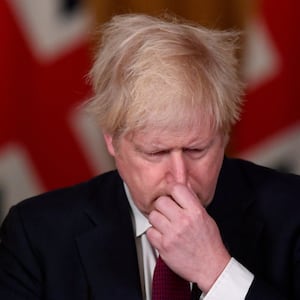If you thought the holiday-fueled coronavirus surge couldn’t get any scarier, public-health experts said Monday they’re concerned that what may be a more transmissible mutation spreading in England is already on our shores.
British Prime Minister Boris Johnson pulled the trigger on the United Kingdom’s most stringent lockdown since March this weekend, calling attention to what some experts believed to be an even more contagious variant of the coronavirus. A flurry of panicked moves by European neighbors followed, and New York Gov. Andrew Cuomo, for one, called for a ban on flights from the U.K. to stem the tide.
“Today, that variant is getting on a plane and landing at JFK,” Cuomo said Sunday. “How many times in life do you have to make the same mistake before you learn?”
ADVERTISEMENT
But the mutation is no reason to radically change course in addressing the pandemic, public health experts told The Daily Beast on Monday. That’s because a new variant was both an anticipated hurdle, and also one that vaccine developers were prepared for.
And while it may be politically appealing to call for border restrictions, experts said even if such strategies are implemented before there’s a trace of a variant, such measures are not particularly effective.
“I feel highly confident the SARS-CoV2 variant is now in the United States,” said Lawrence Gostin, director of the O’Neill Institute for National and Global Health Law at Georgetown University. “Given international travel, it stretches credulity to believe we are protected from the variant.”
Even more certain: The U.S. already has “astronomical” spread of the virus in several states—and a new, more contagious variant may make this winter “even worse than we thought,” according to Dr. Arnold Monto, an infectious disease expert and the acting chair of the Vaccines and Related Biological Products Advisory Committee.
“If this were to become the dominant strain in New York or the U.S. generally, then there is likely to be an even more rapid increase in case numbers, subsequent hospitalizations, and strain on the healthcare system,” Dr. Adrian Hyzler, the UK-based chief medical officer for Healix International, told The Daily Beast.
As Hyzler pointed out, data and models have suggested that it’s likely this new variant has “a much higher transmissibility.” But that there is no evidence yet on which to pin that hypothesis—and certainly none that the new mutation has any change on disease severity. In South Africa, where a similar phenomenon has been observed, scientists have also said that human behavior could explain much of the increased incidents of mutated strains, rather than higher transmissibility.
In a press conference on Monday, WHO Director-General Dr. Tedros Adhanom Ghebreyesus echoed those points, noting that “viruses mutate over time; that’s natural and expected.”
“The bottom line is that we need to suppress transmission of all SARS-CoV-2 viruses as quickly as we can,” added Tedros. “The more we allow it to spread, the more opportunity it has to change.”
Or, as Dr. Jennifer Horney, founding director and professor in the University of Delaware’s epidemiology program, put it: “People really should focus on the fact that human behavior, not viral mutations, continues to drive the current spike in infections with COVID-19."
But if social-distancing and other measures are more critical than ever, experts said wholesale travel bans tend to be more emotional than they are based on science.
“If you don’t get behind the eight ball, god forbid you don’t shut the border, and then it turns out to be true, you’d be crucified,” said Dr. David Langer, the chair of neurosurgery at Lenox Hill Hospital who also worked in RNA research for a number of years.
Monto agreed, saying that “border restrictions have been notoriously poor at inhibiting transmission,” and that such decisions are also elaborately “mired in politics.”
And even though more than 30 countries, from France and Germany to Morocco and Canada, have limited incoming British travel, it’s not clear that choice still makes much sense for the U.S. As Hyzler noted, the variant was first identified in September and has been observed since then in the U.K., meaning “it is highly likely” that it has already entered the U.S. through air travel.
And though other experts agreed with that assertion, they also pointed out that it would be hard to know for sure in the U.S., where genomic surveillance—as a method of detecting mutations before they reach a disaster point—doesn’t really exist.
“You can't find what you don't actively look for,” said Gostin. “I would be very surprised if the variant were not embedded in the US population. It is a ‘fitter’ virus and likely will become a more worrying feature of our COVID response.”
On the bright side, social-distancing, masking, and hand hygiene would still be effective in fighting this new variant, even if it is more contagious. And though Langer, of Lenox Hill, postulated that news coverage of “mutant viruses” is more interesting than “RNA biology,” he believes the sky is not, in fact, falling.
“Obviously, mutation is a huge fear,” Langer said, noting that the Pfizer and Moderna vaccines were tested against dozens of possible scenarios.
“They knew this was possible and studied potential mutations,” said Langer, noting that he has “no concern” that the vaccine will still be effective against such a mutation. “These antibodies are diverse, they attack the protein up and down its chain. The human immune system is amazing, and it’s going to take a lot more than a couple mutations to overcome our immune response.”






